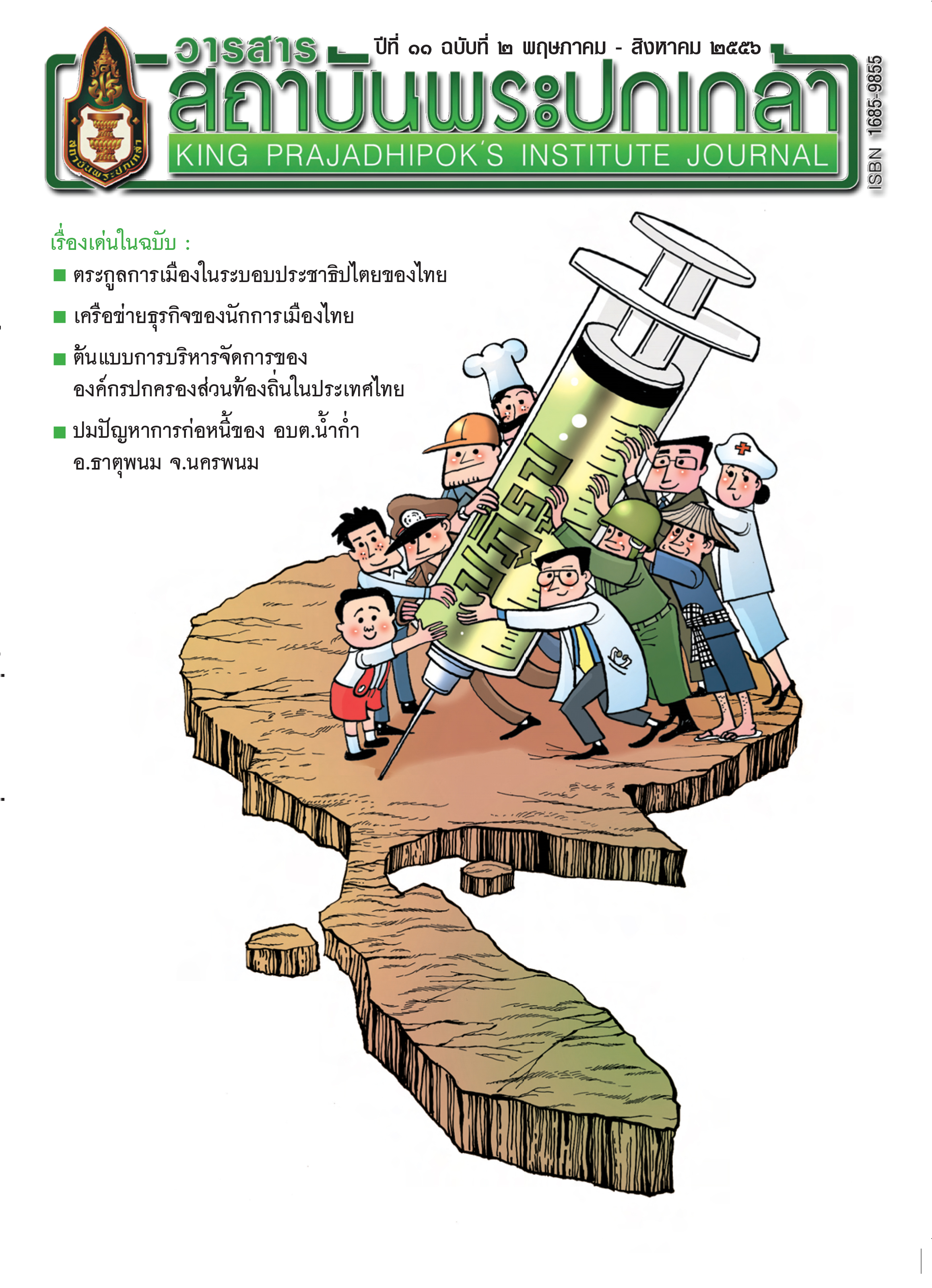ตระกูลการเมือง ในระบอบประชาธิปไตยของไทย
Main Article Content
Abstract
การสืบทอดอำนาจทางการเมืองจากรุ่นสู่รุ่นในวงศ์ตระกูลผู้นำทางการเมืองหรือที่เรียกว่า “ตระกูลนักการเมือง (political dynasty)” นั้นเป็นปรากฏการณ์ที่พบเห็นเป็นเรื่องปกติในแทบทุกสังคม บทความนี้มุ่งทำความเข้าใจบทบาทและพัฒนาการของตระกูลการเมืองในการเมืองและการเลือกตั้งของประเทศไทยโดยอาศัยวิธีการวิจัยเชิงปริมาณทำการสำรวจและรวบรวมข้อมูลนักการเมืองที่มีความสัมพันธ์แบบตระกูลการเมืองจากผลการเลือกตั้งสมาชิกสภาผู้แทนราษฎรเมื่อวันที่ ๓ กรกฎาคม ๒๕๕๔ และนำมาวิเคราะห์เพื่ออธิบายเกี่ยวกับนักการเมืองที่ชนะการเลือกตั้งที่มีความสัมพันธ์กันในลักษณะครอบครัวหรือตระกูลการเมืองว่ามีจำนวนเท่าใดและคิดเป็นสัดส่วนเท่าใดของนักการเมืองที่ได้รับการเลือกตั้งทั้งหมด บทความนี้ยังให้ความสนใจด้วยว่าสัดส่วนของนักการเมืองไทยที่มีสายสัมพันธ์แบบตระกูลในการเลือกตั้งครั้งล่าสุดนี้ สะท้อนถึงความต่อเนื่องของการได้รับการเลือกตั้งของตระกูลการเมืองต่างๆ หรือไม่ โดยการพิจารณาข้อมูลสมาชิกสภาผู้แทนราษฎรของไทยจากปัจจุบันย้อนกลับไปในอดีตจนถึงปี ๒๕๒๒ และสัดส่วนดังกล่าวเป็นสัดส่วนที่มากหรือน้อยเมื่อเปรียบเทียบกับประเทศประชาธิปไตยอื่นๆ ในโลก ผลการศึกษาที่นำเสนอในบทความนี้ได้ชี้ให้เห็นว่าบทบาทและอิทธิพลของตระกูลการเมืองเป็นสิ่งที่อยู่คู่กับการเมืองเรื่องการเลือกตั้งของประเทศไทยมากว่าสามทศวรรษ และยังไม่มีทีท่าว่าจะหมดไปโดยง่าย
Article Details
@ 2020 King Prajadhipok's Institute The Government Complex Commemorating All Right Reserved.
References
คมเดือน เจิดจรัสฟ้า. ๒๕๓๘. ชีวประวัติและทัศนะ บรรหาร ศิลปอาชา: นายกรัฐมนตรีคนที่ ๒๑ ของไทย. กรุงเทพฯ: สร้อยทอง
ชัยยนต์ ประดิษฐศิลป์. ๒๕๕๐. “บทบาททางการเมืองของเจ้าพ่อท้องถิ่นในกระแสโลกาภิวัตน์.” รัฐศาสตร์สาร, ๒๘ (๓): ๑๗๙-๒๒๓.
“เช็กบิลตระกูลการเมืองดัง บารมีวูบ-สอบตก-สูญพันธุ์.” มติชนสุดสัปดาห์ ๑๑ กุมภาพันธ์ ๒๕๔๘.
ฐปนรรต พรหมอินทร์. ๒๕๕๕. การศึกษาความเคลื่อนไหวทางการเมืองและพฤติกรรมการเลือกตั้งสมาชิกสภาผู้แทนราษฎร ๒๕๕๔: กรณีศึกษาจังหวัดสุพรรณบุรี.
ธนวัฒน์ ทรัพย์ไพบูลย์. ๒๕๕๔. เผ่าพงศ์วงศาตระกูลชินวัตร. กรุงเทพฯ: สำนักพิมพ์อนิเมท.
นิรันดร์ กุลฑานันท์. ๒๕๔๙. นักการเมืองถิ่นจังหวัดบุรีรัมย์. นนทบุรี: สถาบันพระปกเกล้า.
ปรีชา หงส์ไกรเลิศ. ๒๕๔๙. “พรรคการเมืองไทย” ใน สถาบันพระปกเกล้า, การเมืองการปกครองไทยในรอบ ๖๐ ปี แห่งการครองราชสมบัติของพระบาทสมเด็จพระเจ้าอยู่หัว. นนทบุรี: สถาบันพระปกเกล้า.
ผาสุก พงษ์ไพจิตร และสังศิต พิริยะรังสรรค์. ๒๕๓๕. รัฐ ทุน เจ้าพ่อท้องถิ่น กับสังคมไทย. เชียงใหม่: ศูนย์ศึกษาเศรษฐศาสตร์การเมือง คณะเศรษฐศาสตร์ จุฬาลงกรณ์มหาวิทยาลัย.
พิชญ์ พงษ์สวัสดิ์. ๒๕๕๕. “ว่าด้วยเรื่องราชวงศ์ทางการเมือง (political dynasty).” คม ชัด ลึก ๒๔ เมษายน ๒๕๕๕: ๔.
รักฎา เมธีโภคพงษ์ และวีระ เลิศสมพร. ๒๕๕๑. นักการเมืองถิ่นจังหวัดเชียงใหม่. นนทบุรี: สถาบันพระปกเกล้า.
วราวุธ ศิลปอาชา. ๒๕๔๘. บทบาทของสมาชิกสภาผู้แทนราษฎรต่อการพัฒนาจังหวัด: กรณีศึกษาจังหวัดสุพรรณบุรี. เอกสารวิชาการส่วนบุคคลหลักสูตรการเมืองการปกครองในระบอบประชาธิปไตยสำหรับนักบริหารระดับสูง รุ่น ๙ สถาบันพระปกเกล้า.
วัลยา (นามแฝง). ๒๕๔๓. ทักษิณ ชินวัตร: ตาดูดาว เท้าติดดิน. กรุงเทพฯ: มติชน.
เวียงรัฐ เนติโพธิ์. ๒๕๔๖. “เจ้าพ่ออุปถัมภ์กับรัฐอุปถัมภ์.” วารสารสังคมศาสตร์ ๔๓ (๑): ๔๔๔-๔๕๖.
ศรีศักดิ์ วัลลิโภดม. ๒๕๓๓. “โคตรเหง้าเหล่ากอเจ้าพ่อตะวันออก.” ศิลปวัฒนธรรม ๑๑ (๘): ๗๖-๘๓.
สถาบันพระปกเกล้า. ๒๕๕๔. ชัยมงคลวัฒนายุ: ๘๔ ปี นายชัย ชิดชอบ. กรุงเทพฯ: สถาบันพระปกเกล้า.
สมบัติ จันทรวงศ์. ๒๕๓๕. “บทบาทของเจ้าพ่อท้องถิ่นในเศรษฐกิจและการเมืองไทย: ข้อสังเกตเบื้องต้น.” ใน ผาสุก พงษ์ไพจิตร และสังศิต พิริยะรังสรรค์, รัฐ ทุน เจ้าพ่อท้องถิ่นกับสังคมไทย. เชียงใหม่: ศูนย์ศึกษาเศรษฐศาสตร์การเมือง คณะเศรษฐศาสตร์ จุฬาลงกรณ์มหาวิทยาลัย.
สัญญลักษณ์ เทียมถนอม. ๒๕๕๐. บรรหาร ศิลปอาชา: ผู้นำระบอบประชาธิปไตย. กรุงเทพฯ: มิติใหม่.
อัครวิทย์ ขันธ์แก้ว. ๒๕๓๙. นักธุรกิจภูมิภาคกับการมีส่วนร่วมทางการเมือง: ศึกษากรณีจังหวัดขอนแก่น. วิทยานิพนธ์รัฐศาสตรมหาบัณฑิต มหาวิทยาลัยธรรมศาสตร์.
Anek Laothamatas. 1988. “Business and Politics in Thailand: New Patterns of Influence.” Asian Survey, 28 (4): 451-470.
Asako, Y., T.Iida, T.Matsubayashi and M.Ueda. 2010. Dynastic legislators: Theory and evidence from Japan. Working Paper No.201201, Waseda University Organization for Japan-US Studies.
Asquer, Raffaele and Federico Calderoni. 2011. “Family Matters: Testing the Effect of Political Connections in Italy.” Symposium: Democracy and Its Development 2005-2011, Center for the Study of Democracy, University of California, Irvine.
Camp, Roderic A. 1982. “Family Relationships in Mexican Politics: A Preliminary View.” Journal of Politics 44(3): 848-862.
Camp, Roderic Ai. 1995. Political Recruitment across Two Centuries: Mexico, 1884-1991. Austin: University of Texas Press.
Clubok, Alfred B., Norman M. Wilensky and Forrest J. Berghorn. 1969. “Family Relationships, Congressional Recruitment, and Political Modernization.” Journal of Politics 31(4): 1035-1062.
Coronel, Sheila, Yvonne T. Chua, Luz Rimban and Booma B. Cruz. 2007. The Rulemakers: How the Wealthy and the well-born dominate Congress. Quezon City: Philippine Center for Investigative Journalism.
Dal Bo, Ernesto, Pedro Dal Bo and Jason Snyder. 2009. “Political Dynasties.” Review of Economic Studies 76 (1): 115-142.
Dye, Thomas R., and Harmon Zeigler. 2006. The Irony of Democracy: An Uncommon Introduction to American Politics, 13th edition. Belmont, CA: Thomson/Wadsworth.
Hedman, Eva and John Sidel. 2000. Philippine Politics and Society in the Twentieth Century: Colonial Legacies, Post-colonial Trajectories. London: Routledge.
Hess, Stephen. 1966. America’s Political Dynasties from Adams to Kennedy. Garden City, New York: Doubleday.
Hutchcroft, P. and J.Rocamora. 2003. “Strong demands and weak institutions: The origins and evolution of the democratic deficit in the Philippines.” Journal of East Asian Studies, 3 (2003): 259-292.
Ishibashi, Michihiro and Steven R Reed. 1992. “Second-Generation Diet Members and Democracy in Japan: Hereditary Seats.” Asian Survey 32 (4): 366-379.
Lasswell, Harold, and Abraham Kaplan. 1950. Power and Society. New Haven, Conn.: Yale University Press.
McCoy, A., Ed.1994. An Anarchy of Families: State and Family in the Philippines. Manila: Ateneo de Manila University Press.
McVey, R. 2000. “Of Greed and Violence, and Other Signs of Progress.” in Money & Power in Provincial Thailand, ed. R. McVey, Hawaii: University of Hawaii Press, 1-29.
Mendoza, Ronald, Edsel L. Beja Jr., Victor Soriano Venida, and David Yap. 2012. An Empirical Analysis of Political Dynasties in the 15th Philippine Congress. Working Paper 12-001, Asian Institute of Management.
Mills, C. Wright. 1956. The Power Elite. New York: Oxford University Press. Nakharin Mektrairat. 1991. “The Economic Base and Power of Modern Thai Political Parties .” in The Making of Modern Thai Political Parties, by Eiji Murashima, Nakharin Mektrairat, and Somkiat Wanthana, pp. 55-87. Tokyo : Institute of Developing Economies.
Ockey, James. 2004. Making Democracy: Leadership, Class, Gender, and Political Participation in Thailand. Honolulu: University of Hawaii Press.
Pasuk Phongpaichit and Chris, Baker. 1997. “Power in Transition: Thailand in the 1990s” in Political Change in Thailand, edited by Kevin. Hewison. London: Routledge.
Pasuk Phongpaichit and Chris, Baker. 2004. Thaksin: The Business of Politics in Thailand. Chiang Mai, Thailand: Silkworm Books.
Phillips, Kevin. 2004. American Dynasty: Aristocracy, Fortune, and the Politics of Deceit in the House of Bush. New York: Viking Adult.
Rossi, Mart?n A. 2009. Political Dynasties: Evidence from a Natural Experiment in Argentina. Working Paper Series, Universidad de San Andres, Argentina. Siripan Noksuan Sawasdee. 2006. Thai Political Parties in the Age of Reform. Bangkok: Institute of Public Policy Studies, Thailand.
Tamada, Yoshifumi. 1991. “Itthiphon and Amnat: An Informal Aspect of Thai Politics.” Southeast Asian Studies 28 (4): 445–465.
Taniguchi, Naoko. 2008. Diet Members and Seat Inheritance. In Democratic Reform in Japan: Assessing the Impact, ed. Sherry Martin and Gill Steel. Boulder, CO: Lynne Reinner.
“๑๐ ตระกูลนักการเมืองดัง สูญพันธุ์ หลังศาล รธน.สั่งประหาร ๓ พรรค-๑๑๑ อดีต ทรท.เปิดบ้านรับเพิ่ม ๑๐๙
คน” มติชน ๔ ธันวาคม ๒๕๕๑. แหล่งที่มา: http://www.matichon.co.th/news_detail.php?newsid =1228307138&catid=01 ค้นเมื่อ ๑๑ กุมภาพันธ์ ๒๕๕๖.
“ประจักษ์ ก้องกีรติ: แนวโน้ม ๗ ประการหลังการเลือกตั้ง ๓ ก.ค.” ประชาไท ๒๐ กรกฎาคม ๑๕๕๔. แหล่งที่มา: http://prachatai.com/journal/2011/07/36106 ค้นเมื่อ ๑ สิงหาคม ๑๕๕๔.
ศูนย์ข้อมูลและข่าวสืบสวน. ๒๕๕๔. “๔๒ ตระกูลการเมืองยกครัวเข้าสภา!” แหล่งที่มา: http://www.tcijthai. com ค้นเมื่อ ๑ สิงหาคม ๒๕๕๔.


